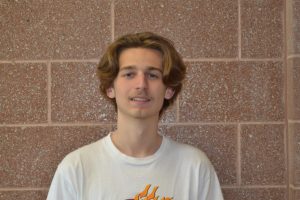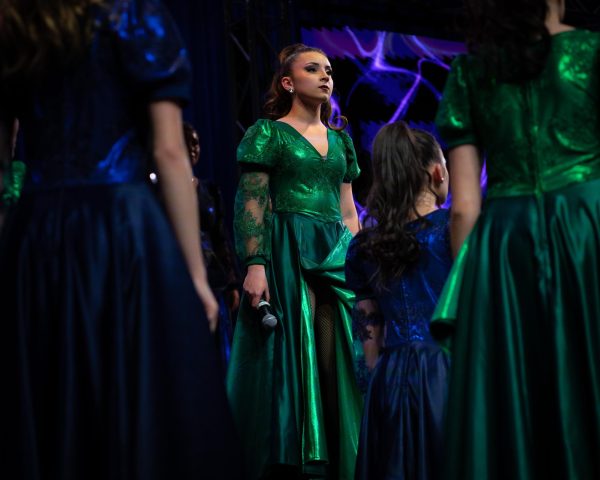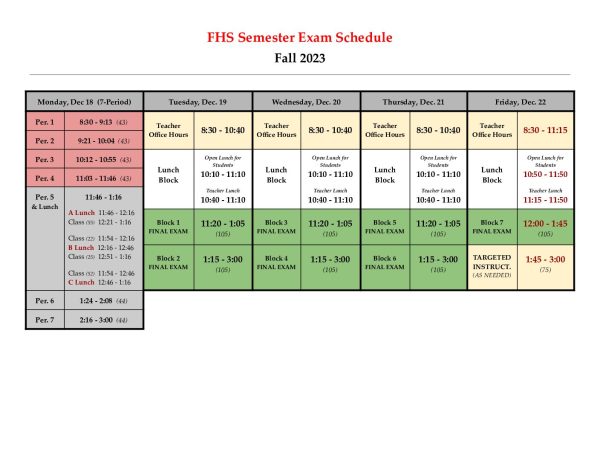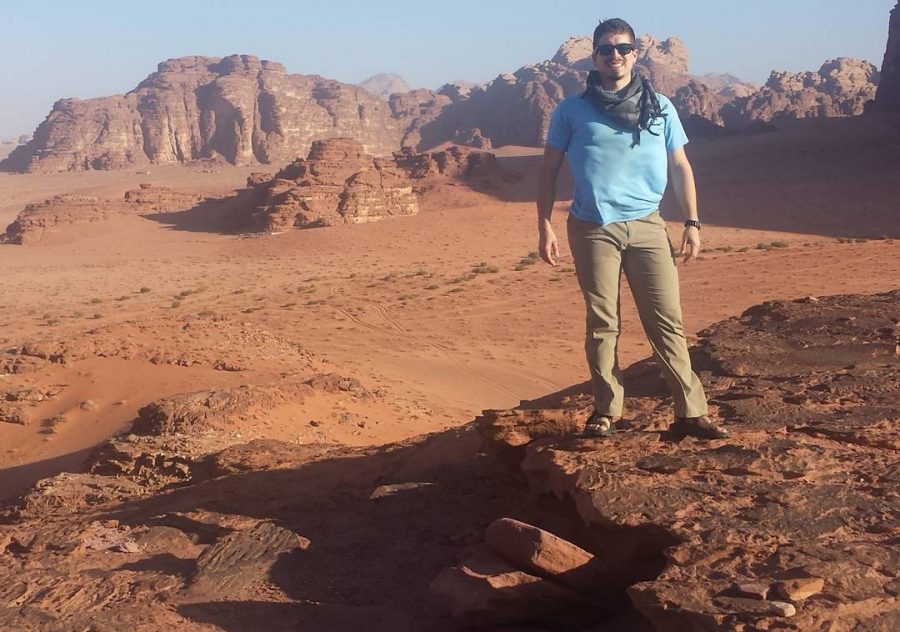Alumni of the month: Stephen Bernard
Photo used with permission by Stephen Bernard.
Bernard stands on a rock structure in the desert in Wadi Rum, Jordan on a visit while stationed Bahrain.
Students are likely familiar with the military at school on some level, as military recruiters can be seen frequently talking to students about a future in the military. Through one conversation it may be difficult to gauge what a military career can provide, but for 2013 alumni Stephen Bernard, it has provided countless global life lessons and experiences.
“I was at FHS from Fall 2008 to Spring 2013,” Bernard said. “They were definitely some of the most formative years of my life with regard to the direction on which I still find myself. I’d characterize it by opportunity. If I had an interest, FHS had an outlet for it.”
Bernard was involved in Project Lead the Way as well as the music program led by Mr. Kunz and Mr. Carpenter. Ultimately, Bernard’s career was most inspired by his time in club rugby and Model U.N.
“Mrs. Bergren and Mrs. Gabbard have my utmost thanks for the time they gave us to prepare for conferences and explore topics directly, and more immediately than the Pythagorean theorem, relevant to our globalized political environment,” Bernard said. “That club put me in rooms with intelligent peers to hash out issues talked about at much higher levels. International relations then became, and continues to be, my most searing passion.”
As a junior, Bernard was invited to play rugby by coach Mr. Trout. Bernard had athletic experience with mixed martial arts but was unfamiliar with rugby. After practicing and watching YouTube videos to better understand the game, he was made a captain of the B-side of the team. He quickly fell in love with the sport and attributes much of his leadership qualities to FHS Rugby Football Club.
“I’ll never forget looking into my teammates’ eyes and seeing their absolute confidence, affording me the opportunity to really bear the burden and honor of their hard work game after game,” Bernard said. “I also learned to love the sport; the contact, the honor and the comradery. Both in high school and in college I played a number six and seven, equivalent to a football linebacker. The adrenaline I got from making decisions under pressure while having a team count on me has never left me.”
The specifics of Bernard’s military interests were influenced by his time at FHS, but his desire to pursue a military career is deeply rooted in his family, and Bernard had planned on joining the military since he was a kid.
“I knew that I wanted to be in the Navy for as long as I could remember,” Bernard said. “My grandfather served on board the USS SALT LAKE CITY in the Pacific theatre during the second world war. I idolized him growing up and unfortunately lost him before I became an adult. I quickly realized that there was nowhere else a 22-year-old could go and have such a high impact; whether it be on the individual lives of the men I get the privilege to lead, or on a mission directed in the interests of our national security.”
Upon graduating from FHS, Bernard attended the Virginia Military Institute, which is one of six senior military colleges in the United States. These schools provide Reserve Officers’ Training Corps Programs under Title 10 of the United States Code, which defines the rules and workings of the military. These six schools differ from military academies in that students are not required to serve in the military following graduation.
For Bernard, he wanted to go to the school with the best international affairs programs while also allowing him to become a Naval Officer, and that was VMI. Majoring in international relations and political science, Bernard wanted to be able to better understand the cultures which were often misrepresented in America.
“All around me were headlines about conflated ideas defining extremism in a region and culture which people truly knew little about,” Bernard said. “Arabic and Chinese are two of the hardest languages for native English-speakers to learn. My mother raised me as a bilingual Latin-American, so I wanted a new linguistic challenge. Every time you learn a language, you learn a new side of yourself. Further, you learn a deepened empathy with the language’s native speakers. Fundamentally, you can’t understand someone if you cannot share expressions.”
Throughout Bernard’s time at VMI, he held numerous leadership positions, such as a Cadet Operations Officer, overseeing the logistics and scheduling for a battalion of roughly 800 students. He also worked as the editor-in-chief of the Cadence Literary Magazine at VMI. Bernard’s defining experiences were his studies abroad.
“In 2016 I lived in Amman, Jordan for six months (where I met my, now, wife) to learn Arabic language and culture,” Bernard said. “I earned conversational proficiency in both Amiyyah, the colloquial dialect of the Levant region, and Fusha, considered modern standard Arabic. Later that year, I was awarded a fellowship to study Chinese Mandarin at SooChow University in Taipei, Taiwan. I earned an elementary proficiency and language certificate while there.”
Bernard recently finished a two-year deployment in Bahrain, an island off the coast of Saudi Arabia. His fleet was responsible for maintaining safety and security in the Arabian Gulf and the Strait of Hormuz. While there, Bernard was able to further his travels in the Middle East, visiting Dubai, Qatar and Oman.
“It’s important to separate the Middle East,” Bernard said. “It is not one contiguous and monolithic region; rather, a very diverse area of our world with intersecting history. The Gulf is different from the Levant, which is different from North Africa”
Of all the places Bernard has visited, he especially cherishes his time in Oman, as he was able to immerse himself in a lively culture that not many get to experience first hand.
“The best place I visited there was Muscat, Oman,” Bernard said. “The country had a soul that brought me fondly back to my time in Jordan. It had one of the most beautiful natural landscapes; high mountain formations starkly contrasted with the keenly blue water we’d see off of the great barrier reef. I felt that I got to break some bread in a culture that is beautifully respecting their past while incorporating a global present. It’s hard to find that deep and enriching soul elsewhere in the gulf region.”
Today, Bernard lives in California working as a Surface Warfare Officer in the U.S. Navy, and he is currently in training to be the navigator on the USS CORONADO.
“As an SWO, my domain is the surface battle,” Bernard said. “Think Russel Crowe in ‘Master and Commander’. We spend years learning the capabilities and limitations of every vessel in our Navy and select threats. SWOs are maritime warfare generalists. We study strike warfare, anti-submarine operations, mine countermeasures, special operation insertion, air and missile defense, and surface-to-surface warfare. Ultimately, the Navy trains us to take command at sea.”
Bernard has recently taken up a new naval assignment, and that is where most of his focus lies, but he hopes to someday earn his JD and enter into local politics. Beyond his military service, Bernard enjoys surfing and jiu-jitsu; as well as fishing, backpacking, hunting and reading. He shares many of these passions with his wife, Sarah.

Ben McHenry is a senior and the features editor for N the Red, and this is his second year on staff. He loves rap music, video games and basketball and...






